GALLUP NEWS SERVICE
PRINCETON, NJ -- Americans tell Gallup that they currently pay an average of $2.09 per gallon for gasoline and anticipate that prices will increase an additional 25 cents per gallon before leveling off, according to a new Gallup Poll. Residents in the Western part of the country report paying more at the pump than people elsewhere do. About half of all Americans are feeling a financial pinch because of the higher gas prices, and most say they drive around to find the cheapest prices. Still, despite the high gas prices, relatively few Americans have changed their summer vacation plans or cut back on household spending. The poll also finds that a majority of Americans think the price increases represent a permanent change.
Westerners Hit Hardest
On average, respondents living in the West are paying $2.27 per gallon of gasoline, and expect prices to increase an average of 31 cents before leveling off at $2.58 per gallon. Easterners, by comparison, are spending an average of $2.12 per gallon. Residents in this region say gas prices will climb to $2.38 per gallon before stabilizing or falling.
In the Midwest, the average price for a gallon of gasoline is $2.04, with expectations that it will rise to $2.30. Southerners tend to be paying less for gasoline than people in other regions are, with an average price at $2.00 per gallon. They expect prices to rise to $2.16.
| Price of a Gallon of Gasoline: Price Today Versus Expected High Price Before It Stabilizes or Goes Down |
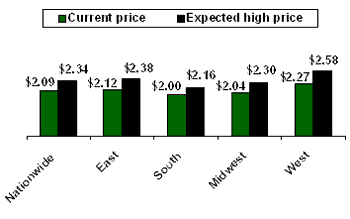 |
| June 3-6, 2004 |
The data show some interesting partisan differences when respondents are asked to estimate how high gas prices will go before they stabilize or start to go down. The average price that Republicans say a gallon of gasoline will reach is $2.25. This compares with an expectation of $2.34 among independents and $2.40 among Democrats.
Half of the Public Reports Financial Hardship Because of Gas Prices
About half of all Americans, 49%, say the higher gas prices have caused them or their families financial hardship, little changed from the percentage who said that in March (47%) and May (47%).
| Have recent price increases in gasoline caused any financial hardship for you or your household? |
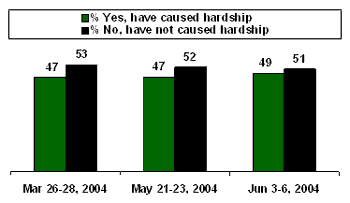 |
There are some differences by age and income:
- Age. Younger Americans are most likely to say gas prices are causing a financial hardship, at 61%. This compares with 52% of 30- to 49-year-olds, 44% of 50- to 64-year-olds, and 35% of respondents aged 65 and older.
| Yes, Increases in Gasoline Prices Have Caused Financial Hardship by age |
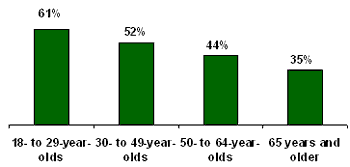 |
| June 3-6, 2004 |
- Income. Not surprisingly, the cost of gasoline is most problematic for lower-income respondents. The poll results show that 65% of respondents earning less than $30,000 a year say gas prices are causing a financial hardship, compared with 50% of those earning between $30,000 and $49,999 a year, 45% of those earning between $50,000 and $74,999 a year, and 30% of those earning $75,000 a year or more.
| Yes, Increases in Gasoline Prices Have Caused Financial Hardship by income |
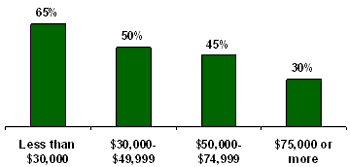 |
| June 3-6, 2004 |
Majority Says Higher Gas Prices More Permanent
According to the poll, 56% of Americans say the current rise in gas prices represents a more permanent change, while 43% say it is a temporary price fluctuation.
Those who believe that the increase is temporary were asked to specify when they felt the price would start to go down. Of all respondents nationwide, roughly 3 in 10 say the price of gasoline will start to go down at the end of the summer (15%) or during the fall (16%). Five percent of Americans are optimistic that gas prices will start to decrease in the next few weeks, and an additional 7% believe that prices will begin to go down next year (5%) or sometime later than that (2%).
The current results show slightly more pessimism among Americans since May, when the public was essentially split on whether the price increases were temporary (48%) or more permanent (50%). However, the June results closely mirror those recorded at the end of March.
| Do You Think the Current Rise in Gas Prices Represents a Temporary Fluctuation in Prices, or a More Permanent Change in Prices? |
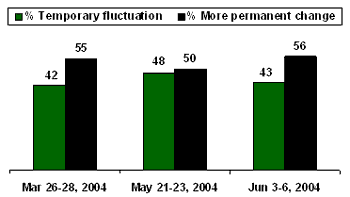 |
Americans Driving to Find Cheapest Gas in Their Area
What exactly have been the implications of the increases in gas prices for Americans' daily lives and financial futures? The poll included a list of five possible impacts of the price increases. The results show that Americans are most inclined to say the price increases have caused them to make more of an effort to find the gas station with the cheapest gas in their area (69%). Slightly more than half of Americans, 53%, say they have seriously considered getting a more fuel-efficient car the next time they buy a vehicle. Americans are less likely to have cut back significantly on their overall driving (45%), cut back significantly on household spending (34%), or altered their summer vacation plans (29%) because of higher gas prices.
|
Americans' Responses to Recent Rise in Gas
Prices
|
||
|
|
No, have not |
|
|
% |
% |
|
|
Made more of an effort to find the gas station with the cheapest gas in your area |
69 |
30 |
|
Seriously considered getting a more fuel-efficient car the next time you buy a vehicle |
53 |
46 |
|
Cut back significantly on how much you drive |
45 |
54 |
|
Cut back significantly on your household spending because of the higher gas prices |
34 |
66 |
|
Altered your summer vacation plans |
29 |
70 |
Majority of Americans Disapprove of How Bush Is Handling Energy Policy
One-third of Americans, 33%, approve of the way George W. Bush is handling energy policy, while a majority, 58%, disapproves. The current energy-policy approval ratings are the lowest Gallup has recorded throughout Bush's administration. In 2001, Bush's rating on energy policy averaged 43%. This increased in 2002 to 57%, but then decreased to an average of 51% by 2003.
| George W. Bush’s Job Approval
Ratings: Handling Energy Policy |
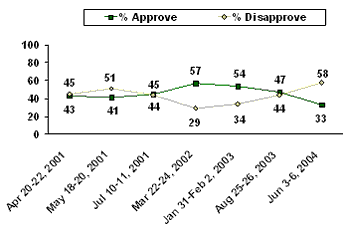 |
Bush's approval on energy illustrates highly partisan differences. Still, according to the current poll, only a relatively modest 58% of Republicans approve of the way Bush is handling energy policy in the country. This compares with 25% of independents and just 15% of Democrats.
Survey Methods
These results are based on telephone interviews with a randomly selected national sample of 1,000 adults, aged 18 and older, conducted June 3-6, 2004. For results based on this sample, one can say with 95% confidence that the maximum error attributable to sampling and other random effects is ±3 percentage points. In addition to sampling error, question wording and practical difficulties in conducting surveys can introduce error or bias into the findings of public opinion polls.
23. Now, thinking about the cost of gasoline, do you think the current rise in gas prices represents -- [ROTATED: a temporary fluctuation in prices, or a more permanent change in prices]?
|
Temporary |
More permanent |
No opinion |
||
|
% |
% |
% |
||
|
2003 Jun 3-6 |
43 |
56 |
1 |
|
|
2004 May 21-23 ^ |
48 |
50 |
2 |
|
|
2004 Mar 26-28 ^ |
42 |
55 |
3 |
|
|
2003 Aug 25-26 |
65 |
33 |
2 |
|
|
2003 Feb 17-19 ^ |
62 |
36 |
2 |
|
|
2001 May 7-9 ^ |
40 |
56 |
4 |
|
|
2000 Jun 22-25 ^ |
57 |
39 |
4 |
|
|
2000 May 23-24 ^ |
45 |
50 |
5 |
|
|
2000 Mar 30-Apr 2 ^ |
60 |
37 |
3 |
|
|
2000 Mar 10-12 ^ |
63 |
34 |
3 |
|
|
^ |
Asked of a half sample. |
|||
24. When do you think the price of gasoline will start to go down in the next few weeks, by the end of the summer, during the fall, next year, or some time later than that?
BASED ON 465 ADULTS WHO DO NOT THINK THE CURRENT RISE IN GAS PRICES REPRESENTS A MORE PERMANENT CHANGE IN PRICES
|
|
|
|
|
Later than that |
|
|
|
2004 Jun 3-6 |
11% |
35 |
37 |
11 |
4 |
2 |
NATIONAL ADULTS: COMBINED RESPONSES
|
2004 Jun 3-6 |
|
|
% |
|
|
Will go down in the next few weeks |
5 |
|
Will go down by the end of summer |
15 |
|
Will go down during the fall |
16 |
|
Will go down next year |
5 |
|
Will go down later than that |
2 |
|
Will not go down/ more permanent |
56 |
|
No opinion |
1 |
25. Have recent price increases in gasoline caused any financial hardship for you or your household?
|
Yes, have |
No, have not |
No |
||
|
% |
% |
% |
||
|
2004 Jun 3-6 |
49 |
51 |
* |
|
|
2004 May 21-23 ^ |
47 |
52 |
1 |
|
|
2004 Mar 26-28 ^ |
47 |
53 |
* |
|
|
2003 Feb 17-19 |
35 |
65 |
* |
|
|
2001 May 7-9 |
47 |
53 |
* |
|
|
2000 Jun 22-25 |
44 |
56 |
* |
|
|
2000 May 23-24 |
36 |
64 |
* |
|
|
2000 Mar 30-Apr 2 |
39 |
61 |
* |
|
|
2000 Mar 10-12 |
41 |
59 |
* |
|
|
2000 Feb 14-15 † |
40 |
60 |
* |
|
|
* |
Less than 0.5% |
|||
|
^ |
Asked of a half sample. |
|||
|
† |
WORDING: Have recent price increases in gasoline, diesel fuel, and home fuel oil caused any financial hardship for you or your household? |
|||
26. As a result of the recent rise in gas prices, would you say you have -- or have not -- done each of the following? How about -- [RANDOM ORDER]?
A. Cut back significantly on how much you drive
|
Yes, have |
No, have not |
No opinion |
|
|
2004 Jun 3-6 |
45% |
54 |
1 |
B. Altered your summer vacation plans
|
Yes, have |
No, have not |
No opinion |
|
|
2004 Jun 3-6 |
29% |
70 |
1 |
C. Seriously considered getting a more fuel-efficient car the next time you buy a vehicle
|
Yes, have |
No, have not |
No opinion |
|
|
2004 Jun 3-6 |
53% |
46 |
1 |
D. Made more of an effort to find the gas station with the cheapest gas in your area
|
Yes, have |
No, have not |
No opinion |
|
|
2004 Jun 3-6 |
69% |
30 |
1 |
E. Cut back significantly on your household spending because of the higher gas prices
|
Yes, have |
No, have not |
No opinion |
|
|
2004 Jun 3-6 |
34% |
66 |
* |
|
* Less than 0.5% |
|||
27. About how much would you say you currently pay for a gallon of gasoline?
|
2004 Jun 3-6 |
|
|
Less than $1.75 |
1% |
|
$1.75-$1.99 |
34 |
|
$2.00-$2.24 |
46 |
|
$2.25-$2.49 |
12 |
|
$2.50 or more |
4 |
|
No answer |
3 |
|
Mean |
$2.09 |
|
Median |
$2.05 |
28. How high do you think the price of a gallon of gasoline will go in the area where you live before the price either stabilizes or begins to go down?
|
2004 Jun 3-6 |
|
|
Less than $1.75 |
1% |
|
$1.75-$1.99 |
9 |
|
$2.00-$2.24 |
34 |
|
$2.25-$2.49 |
19 |
|
$2.50 or more |
31 |
|
No answer |
6 |
|
Mean |
$2.34 |
|
Median |
$2.25 |

